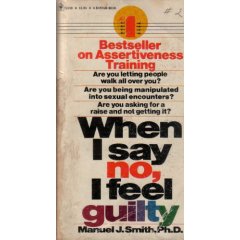"When I Say 'No' I Feel Guilty" - Assertiveness Training

When I Say ‘No’ I Feel Guilty was one of the best-known titles of self-help books devoted to “Assertiveness Training,” a wildly popular movement during the Seventies that, unlike est and the other wacky programs from that era, was actually taken seriously by some people in the mental health field. I had a professor in an undergraduate course entitled “The Psychology of Adjustment” who actually assigned the book. We had lots of fun with it, although it’s doubtful whether anybody changed as a result of reading this masterpiece.
“Assertiveness,” shrinks such as Manuel J.Smith were quick to point out, is not the same as “Aggressiveness!” Being aggressive was all about forcing your will upon others, while assertiveness was simply sticking up for yourself and asking for what is rightfully yours. Needless to say, the difference between these wasn’t always clear. A widely popular “Ziggy” cartoon showed the character entering a door with a sign reading something like “Assertiveness Training class. Just barge on in!”
Smith’s book was loaded with his own jargon – a popular practice of self-help authors, along with numerous case examples of his students’ attempts at being assertive. My favorite was a technique called “Broken Record,” in which you assert yourself by repeating what you want over and over. Smith cites the example of a client named Manuel who has had the food he has purchased taken away from him by some supermarket personnel. He recites a long dialogue in which each statement by the now calm and assertive Manuel ends with “and I want my meat!” Needless to say, he gets it. (Self help techniques always work in the books). The Melodrama of Manuel’s Meat made for many jokes in our college cafeteria.
Besides confiscated pork chops, another problem dealt with by Smith concerned dealing with those soliciting for charity or asking for favors. The book advocates repeatedly using a simple phrase such as “I understand, but I’m just not interested!” We worked on this one in class, with students role-playing. One would go on-and-on about starving children or some other horror while the other practiced the great mantra.
Probably the funniest exercise in our class (and I am not certain whether this was in Smith’s book) concerned dealing with criticism by simply agreeing with it. Again using role-playing, our esteemed professor had students volunteer to play a bartender dealing with an extremely obnoxious patron who keeps making such comments as “You know, it’s kind of funny for a bartender to be wearing glasses.”

0 Comments:
Post a Comment
Subscribe to Post Comments [Atom]
<< Home